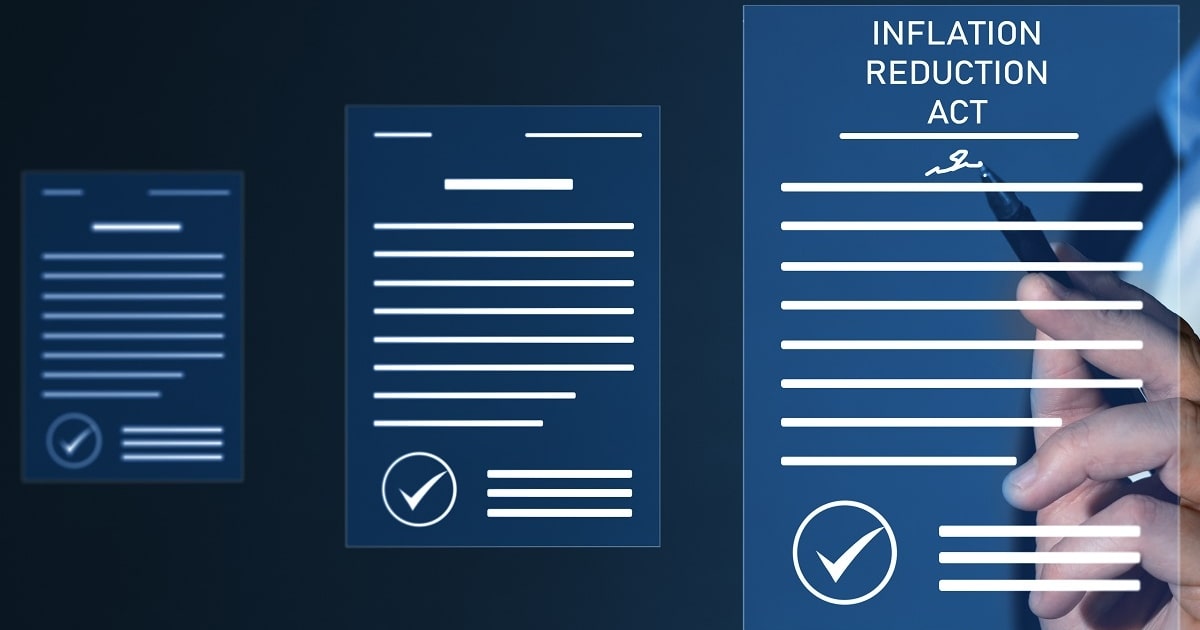Summary: President Biden recently signed the Inflation Reduction Act into law. While it focuses on savings for consumers on healthcare and credits toward clean energy, many parts of the Act will directly impact small businesses.

What is the Inflation Reduction Act?
The
Inflation Reduction Act helps consumers and small businesses by reducing prescription drugs, health care, and energy costs while lowering the deficit. The law also combats climate change issues by offering credits for purchasing electric vehicles (EVs) and other clean energy incentives. The goal of the energy portion of the legislation is to ultimately lower consumer costs and help the U.S. meet emissions goals.
Ways the Act will Impact Small Business
The legislation helps small businesses by investing in deficit reduction to fight inflation over the years, increase manufacturing, and lower healthcare costs. It is the most significant investment in control measures and clean energy.
Let’s break down each fact of the IRA to see how it impacts small businesses now and in the future.
Taxes and Small Business Credits
The new law will not raise taxes on small businesses or working families that make under $400,000 a year. The Inflation Reduction Act is partially being paid for by implementing a 15% minimum tax on corporations that make over $1 billion in revenue. This tax applies to around 150 corporations and doesn’t directly affect small businesses. However, it is expected to bring over $300 billion in tax revenue. The law also includes a 1% excise tax on corporate stock buybacks and
imposes a limit on losses that businesses can deduct from their taxes.
Starting in 2023, the IRA will give small businesses with little revenue an additional $250,000 of the refundable
research and development tax credit to go towards payroll taxes or other expenses, including product development and technology.
A significant portion of the Inflation Reduction Act includes $80 billion in additional funding over ten years to the Internal Revenue Service (IRS). The funding will upgrade outdated processing systems and improve tax enforcement, including hiring additional IRS agents.
Healthcare Provisions in Inflation Reduction Act
Many small businesses use the federal Health Insurance Marketplace to insure themselves and their employees. The Inflation Reduction Act
extends the Affordable Care Act (ACA) premium subsidies (up to $800) through 2025 and expands the eligibility for the program. The IRA allows Medicare to negotiate drug prices starting with ten drugs in 2026 and caps Medicare recipients’ drug expenditures at $2,000 per year.

Inflation Reduction Act Promotes Clean Energy
The most significant portion of the IRA is the investment in clean energy incentives for consumers and businesses. The IRA promotes clean energy by lowering energy costs for consumers and small businesses. The energy portion of the legislation includes $369 billion in incentives for renewable energy, including electric vehicles. The legislation aims to
reduce greenhouse gas emissions by about one gigaton in 2030 to promote clean energy and reduce particle pollution from fossil fuels. Also, the clean energy tax credits in the program
incentivize domestic production of clean energy technologies, such as wind, solar and geothermal energies, supporting American manufacturers and workers, and adding good-paying jobs.
The clean energy incentives could impact small business owners in multiple ways, including:
- Energy-efficient commercial buildings: Starting in 2023, the IRA offers building owners and lessees that bring commercial buildings up to a specific energy-efficient standard a tax deduction of $5 per square foot. The deduction applies to constructing commercial buildings and the costs of retrofitting older buildings.
- Electric vehicles: The IRA includes a $7,500 tax credit for new electric vehicles that will go into effect for cars in service after December 31, 2022, and run through 2032. The IRA also extends a 30% (or up to $1,000) federal tax credit on charging equipment for individual or residential use through 2032. To be eligible for the IRA credit, new EVs that are vans, SUVs or trucks can not exceed $80,000, sedans and other vehicles can not cost more than $55,000 and used EVs can’t be more than $25,000. The credit will apply to EV vehicles made in the United States. The tax credit for commercial electric vehicles is up to $7,500 for those weighing under 14,000 pounds and $40,000 for those weighing 14,000 pounds or more.
Inflation Reduction Act Looks to the Future
The healthcare and clean energy investments made in the IRA will provide cost savings to small businesses and help create jobs for small businesses through contracting opportunities. It will also help small businesses transition to electric vehicles to ultimately help reduce the growing effects of climate change.

AmTrust Understands Small Business Insurance
As experts in small business insurance and the third largest
Workers’ Compensation insurance provider, AmTrust understands what it takes to protect your organization from various risks. We offer the coverage you need with the personalized attention your small business deserves. For more information about our
small business insurance products , please
contact us today.
This material is for informational purposes only and is not legal or business advice. Neither AmTrust Financial Services, Inc. nor any of its subsidiaries or affiliates represents or warrants that the information contained herein is appropriate or suitable for any specific business or legal purpose. Readers seeking resolution of specific questions should consult their business and/or legal advisors. Coverages may vary by location. Contact your local RSM for more information.